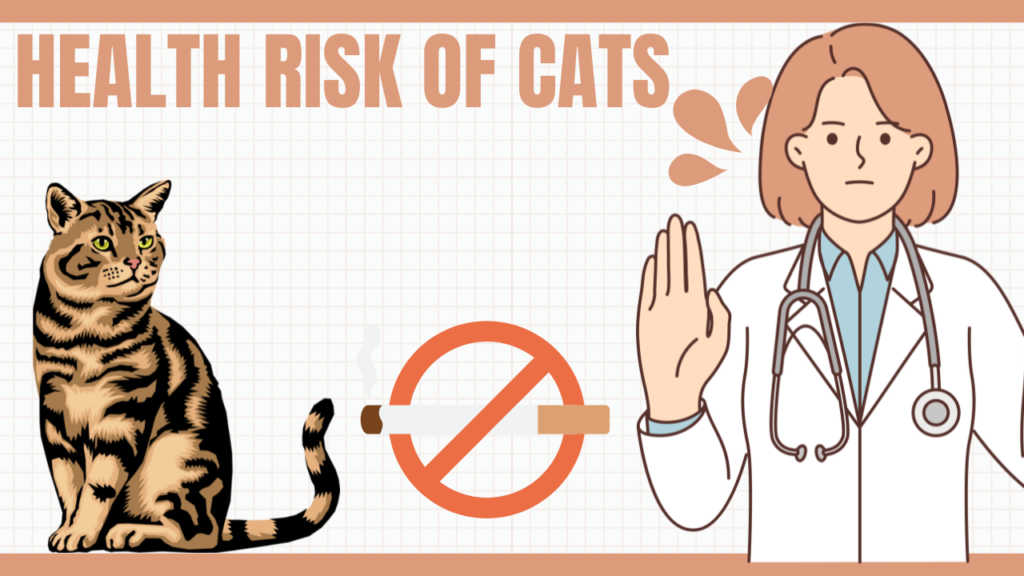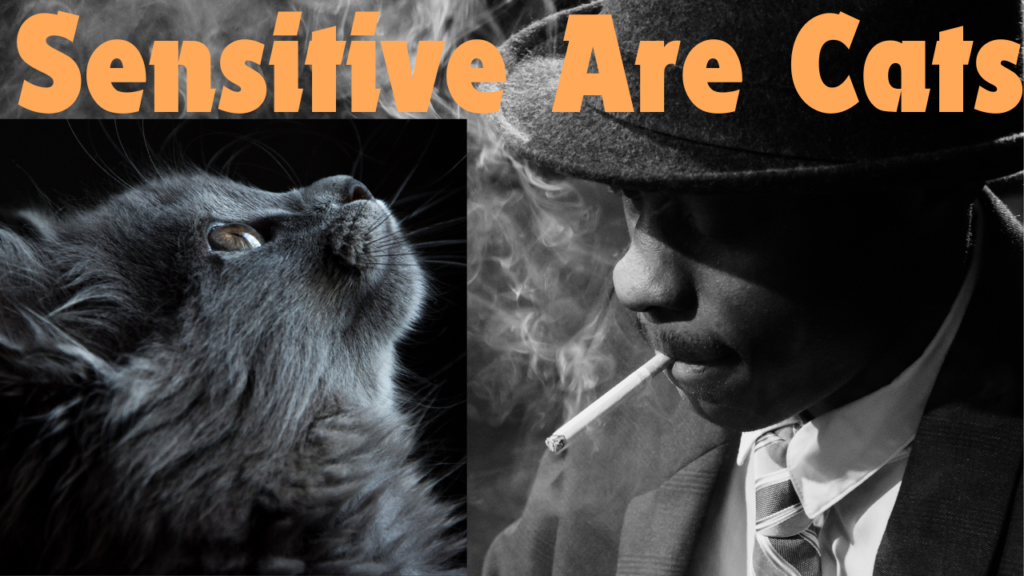Cats are known for their heightened senses, making them extremely aware of their environment. But how sensitive are they to smoke? Whether it’s from cigarettes, fireplaces, or even incense, cats’ respiratory systems can react negatively to smoke in ways that may surprise their owners. In this article, we will explore how different types of smoke affect cats, the potential health risks involved, and how to ensure the safety of your feline friend.
Why Cats Are More Sensitive to Smoke than Humans
Cats possess a delicate respiratory system that can be easily irritated by airborne pollutants. Unlike humans, cats breathe at a faster rate and have a smaller lung capacity, which makes them more susceptible to inhaling harmful particles present in smoke. Additionally, cats’ frequent grooming habits contribute to the problem as they lick their fur and inadvertently ingest the toxins that settle on it.
Anatomical Factors Contributing to Smoke Sensitivity
Cats’ nasal passages are significantly smaller than those of humans, meaning even a small amount of smoke can cause considerable irritation. The cilia, which are tiny hair-like structures in the nasal passages, trap particles in the air and help filter it before it reaches the lungs. However, in cats, these filters can easily become overwhelmed by the particles present in smoke, leading to respiratory distress. This combination of anatomical factors and environmental exposure creates a scenario where smoke can pose a serious risk to their health.
Types of Smoke that Affect Cats
Cigarette Smoke
Cigarette smoke is one of the most common types of smoke that negatively affects cats. Secondhand smoke contains more than 7,000 chemicals, many of which are toxic or carcinogenic. Cats exposed to cigarette smoke are at an increased risk of developing respiratory issues such as asthma, bronchitis, and even lung cancer. Additionally, secondhand smoke clings to a cat’s fur, which they later ingest through grooming, further compounding their exposure.
Long-term exposure to cigarette smoke has been linked to serious health problems such as feline asthma, respiratory infections, and chronic bronchitis. Cats are particularly vulnerable to developing lymphoma, a type of cancer that affects the immune system, in homes where there is regular smoking.
Smoke from Fireplaces and Wood Stoves
Though seemingly harmless, fireplace smoke or smoke from wood-burning stoves can also irritate a cat’s sensitive lungs. Even in small amounts, this type of smoke contains particulates that are harmful when inhaled regularly. Cats are likely to spend time near fireplaces for warmth, putting them directly in the path of smoke emissions. This can cause them to develop breathing difficulties, especially if they already suffer from pre-existing respiratory conditions.
Particulate matter in wood smoke is fine enough to be inhaled deeply into a cat’s lungs, where it can cause inflammation and worsen any existing respiratory conditions. Prolonged exposure may lead to long-term lung damage.
Incense and Scented Candles
While often overlooked, incense and scented candles produce smoke that can be harmful to cats. The essential oils and chemicals in incense sticks and candles can trigger allergic reactions, and the smoke itself can irritate the lungs. Prolonged exposure to these types of smoke can lead to chronic respiratory issues.
In addition to the smoke, some of the chemicals found in incense and candles may be toxic to cats. Ingredients like benzene, formaldehyde, and acetone, often present in scented products, are dangerous to both the respiratory and immune systems of cats.
Health Risks Associated with Smoke Exposure in Cats
Cats that are regularly exposed to smoke, regardless of the source, are at risk of developing a range of health problems. Some of the most common include:
Respiratory Issues
Smoke inhalation can cause immediate respiratory distress in cats. This can manifest in symptoms such as coughing, sneezing, and wheezing. Chronic exposure may result in more severe respiratory conditions like asthma, bronchitis, and chronic obstructive pulmonary disease (COPD). Cats with existing respiratory conditions will experience worsening symptoms when exposed to smoke.
Cancer Risks
As mentioned earlier, secondhand smoke has been linked to an increased risk of lymphoma in cats. Cats exposed to smoke have a higher likelihood of developing both lung cancer and mouth cancer due to their grooming habits. The constant licking of fur contaminated with smoke particles leads to direct ingestion of carcinogens, increasing the risk of cancer in the mouth and digestive tract.
Eye and Skin Irritation
The toxins in smoke don’t just affect a cat’s lungs. Smoke can also irritate their eyes, causing redness, excessive tearing, and squinting. Additionally, particles from smoke can settle on a cat’s fur and skin, leading to irritation and itching. This is especially concerning for cats with allergies or sensitive skin, as exposure to smoke exacerbates these conditions.

How to Protect Your Cat from Smoke
Avoid Smoking Indoors
The most effective way to protect your cat from cigarette smoke is to avoid smoking indoors. If quitting smoking is not an option, make sure to smoke outside or in a well-ventilated area far from your cat. Even better, designate a specific smoking zone outside your home to prevent smoke from contaminating your cat’s living space.
Ventilate the Living Area
For homes with fireplaces, wood stoves, or regular use of scented products, ensuring proper ventilation is crucial. Make use of air purifiers with HEPA filters to trap smoke particles and improve air quality. Regularly airing out the house by opening windows can also help to reduce the amount of smoke your cat inhales.
Use Smokeless Alternatives
Opt for smokeless candles or essential oil diffusers instead of incense or traditional scented candles. Ensure that the essential oils used are safe for cats, as some oils can be toxic even in vapor form. Using electric fireplaces rather than wood-burning ones can significantly reduce the amount of smoke in your home.
Frequent Grooming
Help reduce your cat’s exposure to smoke particles by regularly grooming them. This will remove smoke residue that settles on their fur, reducing the chances of ingestion. Bathing your cat occasionally, especially if they are exposed to smoke regularly, will also help eliminate toxins from their skin and coat.
Monitor for Signs of Respiratory Distress
Always be on the lookout for signs that your cat may be suffering from smoke exposure. Symptoms such as persistent coughing, sneezing, wheezing, and difficulty breathing should not be ignored. If you notice any of these signs, consult with a veterinarian immediately. Early detection of respiratory issues can prevent more serious health problems in the long run.
Conclusion
Cats are highly sensitive to smoke due to their small respiratory systems and unique grooming habits. Exposure to smoke from cigarettes, fireplaces, and scented products can lead to a range of health issues, including respiratory problems, cancer, and skin irritation. Protecting your cat from smoke requires proactive measures such as avoiding smoking indoors, ensuring proper ventilation, and using smokeless alternatives.
Ensuring a smoke-free environment is crucial for the long-term health and well-being of your feline companion. By taking steps to limit their exposure to smoke, you can help your cat live a longer, healthier life.


